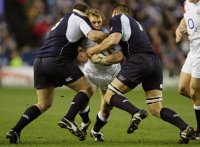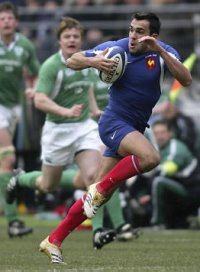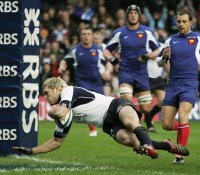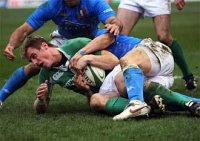Wales come unstuck at Lansdowne Road
Wales went into Sunday's Six Nations encounter with Ireland determined to exorcise the demons that have gathered around their camp during the past fortnight. Instead, they picked up a few new spooks as the Ireland took full advantage of a hapless Welsh display to record a comprehensive 31-5 victory at Lansdowne Road.

Welsh rugby was already rocking from the sudden departure of Grand Slam-winning head coach Mike Ruddock amid rumours of player power being a major factor.
And now their grip on the title is effectively over with Ireland, Scotland, France and England tied on four points apiece.
Wales, without injured captain Gareth Thomas, made a dominant start inspired by fly-half Stephen Jones, and they took an eighth-minute lead through winger Mark Jones.
But Stephen Jones limped off injured after 19 minutes and that proved the turning point.
Gavin Henson, returning to Test rugby for the first time in a year, endured a miserable afternoon in his place and and must have wished he was still sunning himself on the beach in South Africa. With the polemic celebrity author holding the reins, Wales lost all momentum.
Just 11 months after recording a first Grand Slam in 27 years, Welsh rugby has seemingly shot itself in the foot and, despite the best efforts of the union, cannot control the bleeding.
As far as Welsh fans were concerned, the finger of blame points towards player power and Welsh Rugby Union executives.
Either way, the national team has been left without a head coach -- or even a coach with any form of contract -- midway through the defence of their Six Nations title.
Such is the discontent and suspicion in the valleys that WRU chief executive Steve Lewis feels it necessary to go on the road and address the 245 member clubs directly.
To make matters worse, just days after Ruddock's departure the Wales captain Gareth Thomas gave an animated defence of his role in the saga, only to collapse later that night and be rushed to hospital in fear of his life.
Thomas was diagnosed with a damaged artery in his neck and will not feature again in the championship.
Of course, those who believe Ruddock was forced out by player power will argue there is no reason why Wales should have been distracted by the events of the last fortnight -- after all, they got what they wanted according to some observers.
But Johnson could not inspire a victory in his first Test in sole charge and how Wales missed Thomas's leadership and Stephen Jones's influence.
The fly-half took immediate control of the game. The strong Lansdowne Road cross-wind hampered Wales's initial attempts at playing expansive rugby and they learned quickly.
Wales kept it tight, sniped around the fringes and punctured holes in the Irish defence. Stephen Jones, who had already made one half-break, charged forward 20 yards.
Matthew Watkins chipped over the top and the ball bounced kindly for winger Mark Jones to dive and score in the corner. The try was confirmed by the television match official Marius Jonker, though Stephen Jones missed the difficult touchline conversion.
Ronan O'Gara landed a penalty in reply but Ireland, statistically the slowest starters in the championship, remained under the cosh.
Then came the killer blow for Wales. Stephen Jones, who had been enjoying a hugely productive afternoon, limped off after 19 minutes.
Henson entered the fray to a cacophony of boos and his first real act was to miss a tackle on Trimble as Ireland burst out of their own 22.
The momentum had swung permanently Ireland's way. Denis Leamy just failed to ground the ball after a quick tap penalty but David Wallace charged over from the back of the resulting scrum and this time the busy Jonker awarded the score.
Henson was not enjoying a pleasant afternoon. A sliced clearance was greeted by catcalls from the crowd and Ireland launched a silky counter-attack.
Hooker Jerry Flannery was stopped inches from the line by a last-ditch tackle from Shane Byrne -- who was an impressive understudy for Thomas -- but O'Gara landed a second penalty to extend Ireland's half-time advantage.
Wales had to score first after the break but Ireland were immediately on the front foot.
Brian O'Driscoll's break down the right forced Dwayne Peel to clear up, but soon afterwards Horgan found a giant gap in the Welsh defence and ran over untouched for Ireland's second try.
O'Gara converted and then landed a third penalty as Ireland raced clear.
Wales lacked shape and cohesion. Henson was not in control behind the scrum, and it seemed a matter of time before Ireland scored again.
There was a long delay for Marcus Horan, who was taken off on a stretcher with his neck in a brace after being caught awkwardly as he attempted to secure a loose ball.
But Ireland duly finished with a flourish and scrum-half Peter Stringer dived over from close range with O'Gara's conversion completing a miserable afternoon for Wales.
Man of the Match: David Wallace was all brave and effective endeavour for Ireland, Peter Stringer was as busy as ever and Brian O'Driscoll so effective, especially on defence. Shane Horgan scored a splendid try and looked for work. But one player stood out above disappointment, disorganisation and mediocrity -- Dwayne Peel, the Welsh scrum-half, a player of star quality and undoubted courage.
Moment of the Match: Gavin Henson's appearance -- all of his appearance -- and his reception, a jeering reception that went on for the whole of his stay on the field. When Stephen Jones went off injured early in the first half, Henson rose from the bench and removed his tracksuit bottom to reveal natty black shorts of the style dancing girls use at rugby matches. He pulled on his white shirt and jogged onto the field, tanned in winter, hair sleeked back like Rudolph Valentino of silent films. His arrival caused an outbreak of booing from the unforgetting Irish who remembered what he had had to say about their hero, Brian O'Driscoll. The jeering went on and on. Each time he touched the ball there was a mixture of boos and wolf whistles. And, sadly, his performance had no star quality about it. He was not the Sheik of Swansea riding to the rescue of his dragons in distress.
Villain of the Match: Ireland loose forward Denis Leamy for his gratuitous stamp on the back of prone Michael Owen who was in no position to defend himself or retaliate. It earned Leamy a yellow card, which suggests that there are people more intent on stamping out stamping than defending it in the O'Driscoll way.
The scorers:
For Ireland:
Tries: Leamy, Horgan, Stringer
Cons: O'Gara 2
Pens: O'Gara 4
For Wales:
Try: M Jones
Yellow card(s): Leamy (Ireland) -- stamping, 76
The teams:
Ireland: 15 Geordan Murphy, 14 Shane Horgan, 13 Brian O'Driscoll (Captain), 12 Gordon D'Arcy, 11 Andrew Trimble, 10 Ronan O'Gara, 9 Peter Stringer, 8 Denis Leamy, 7 David Wallace (Johnny O'Connor, 74), 6 Simon Easterby (Mick O'Driscoll, 76), 5 Malcolm O'Kelly, 4 Donncha O'Callaghan, 3 John Hayes, 2 Jerry Flannery (Rory Best, 77), 1 Marcus Horan (Simon Best, 71).
Unused replacements: Eoin Reddan, 21 David Humphreys, 22 Girvan Dempsey.
Wales: 15 Lee Byrne (Barry Davies, 78), 14 Mark Jones, 13 Hal Luscombe, 12 Matthew Watkins, 11 Dafydd James, 10 Stephen Jones Gavin Henson, 21), 9 Dwayne Peel, 8 Michael Owen (captain), 7 Martyn Williams, 6 Colin Charvis (Gareth Delve, 55), 5 Robert Sidoli, 4 Ian Gough, 3 Adam Jones, 2 Rhys Thomas (Mefin Davies, 60), 1 Duncan Jones (Gethin Jenkins, 44).
Unused replacements: 18 Jonathan Thomas, 20 Michael Phillips.
Referee: Jonathan Kaplan (South Africa)
Touch judges: Chris White (England), Malcolm Changleng (Scotland)
Television match official: Marius Jonker (South Africa)






